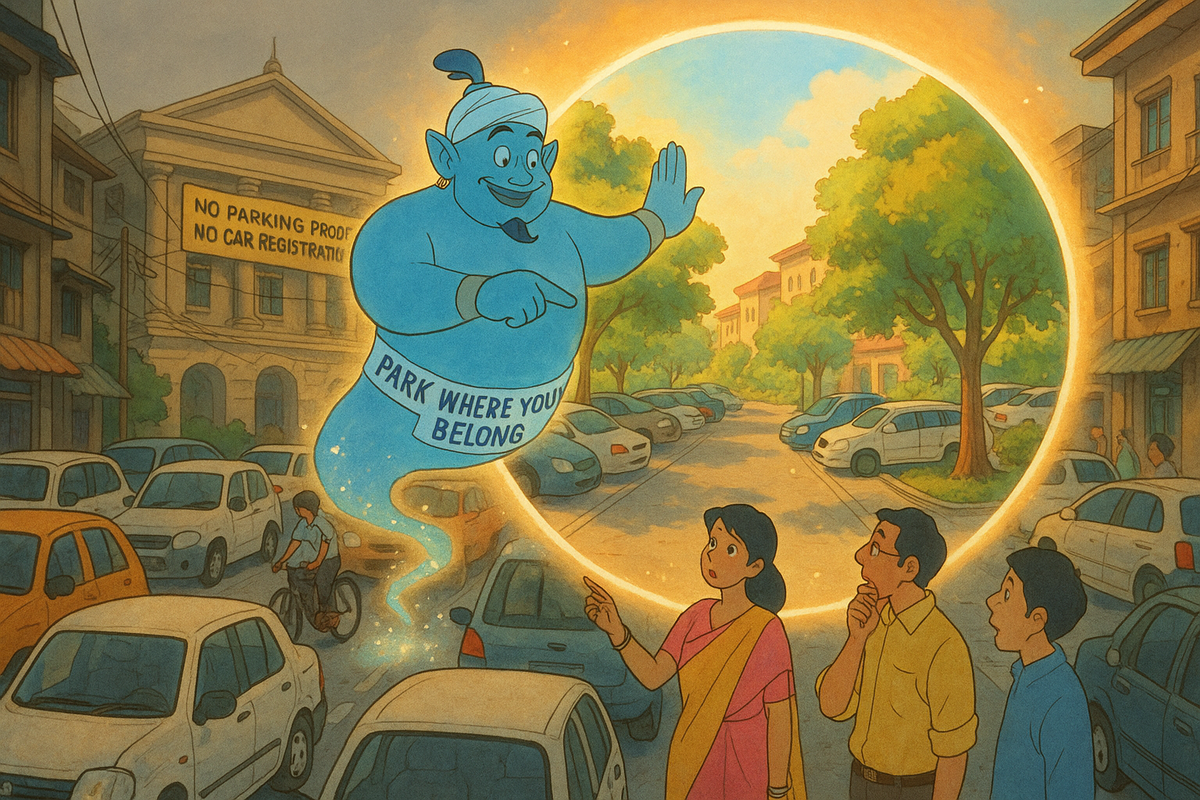No Parking, No Car – What Maharashtra’s Policy Means for Urban India
Maharashtra’s new policy demands proof of parking before car registration. What does this mean for Indian cities? A road reform or a wake-up call?

🧞♂️ Greetings, space seekers! When the city runs out of room, something must give. Maharashtra’s new stance isn’t just a rule — it’s a revelation. Let’s decode what happens when your car needs a home before a road.
1. Introduction: A Bold Parking Wake-Up Call
In May 2025, Maharashtra’s Transport Minister made a strong statement: “If there’s no space to park, you shouldn’t own a car.” The message was clear — urban chaos isn’t sustainable, and vehicle ownership must meet spatial accountability.
For a state home to megacities like Mumbai and Pune — both struggling with illegal parking, shrinking road widths, and rising vehicle numbers — this marks a critical turning point in mobility policy.
But what does this mean for everyday drivers, builders, planners, and the future of Indian cities?
2. What the New Policy Proposes
While formal legislation is still in progress, the policy direction suggests:
- Proof of parking space before car registration — a clause already seen in global cities like Tokyo
- Stricter monitoring of on-road and unauthorized parking via municipal enforcement
- Integration of parking norms into urban planning permissions
- Public-private parking partnerships to expand capacity where land allows
It’s a bold attempt to control demand — not just expand supply. And it signals a shift from reactive to proactive urban management.
3. The Parking Crisis in Indian Cities
India’s urban vehicle count is exploding — but our road and parking space? Not so much. Consider this:
- India adds 20,000+ vehicles daily, but has added very little regulated parking infrastructure in the last decade
- More than 60% of urban road space in metros like Mumbai is choked by roadside parking
- Towing has increased by over 40% in 2 years in Pune and Delhi, overwhelming civic bodies
Most households own more than one vehicle. Yet designated parking — residential or commercial — is often missing, misused, or sold illegally.
And so, the street becomes a garage. The sidewalk becomes a showroom. And the city loses space for people.
4. Public Reaction & Debate
As expected, the announcement stirred a spirited conversation across the country. Citizens, urban planners, and real estate bodies are divided:
- Supporters say: It's about time. Urban roads must serve movement, not storage.
- Critics argue: What about middle-class families in older buildings with no designated space?
- Environmentalists applaud: Fewer cars = lower emissions, less urban heat, cleaner air.
- Automobile lobbies caution: It may affect car sales and penalize legitimate buyers.
Concerns of class disparity and lack of robust public transport add weight to the opposition. But the policy has succeeded where discussion failed — it has made parking a national conversation.
5. Will It Work? Global Examples & Local Realities
This approach isn’t new globally:
- Tokyo: Car buyers must show proof of a parking space before registration
- Singapore: Has limited car ownership through COE (Certificate of Entitlement) linked to parking feasibility
- Amsterdam: Reduced on-street parking to improve walkability and reduce emissions
But can Indian cities emulate these models? That depends on:
- Enforcement infrastructure (digital + ground-level)
- Builder accountability for promised parking spaces
- Affordable public transport alternatives
Pune and Mumbai have piloted towing corridors, and “no-parking zones” near market hubs — but implementation remains inconsistent.
6. Conclusion: Parking Policy = Urban Future
As urban India grows vertical and dense, roads can no longer be treated as storage yards. Parking isn’t a right — it’s a responsibility.
As your thoughtful Genie, I say this: a city that controls parking controls chaos. Because where a car sleeps affects how a city wakes.
Urban calm begins where cars find a rightful home — off the street.
Follow us on:
🅾 Instagram |
ⓕ Facebook |
𝕏 X |
▶️ YouTube |
🟢 WhatsApp
🚦 More SpotGenie Gyaan on Urban Policy, Parking, and Smarter Streets
- Urban Parking 101 – What’s Legal and What’s Not in Indian Cities
- How Citizens Can Help Decongest India’s Streets – Civic Solutions Matter
- The Problem With Jaywalking – Why Pedestrian Safety Is Urban Policy
- The Hidden Cost of Road Rage – Emotional and Legal Fallout of Urban Chaos
- Get SpotGenie – Smart QR Sticker to Handle Parking and Alerts with Empathy
Smart streets need smart policies — and smarter citizens. With SpotGenie Gyaan, understand what’s at stake when space becomes policy.



